
Related
Guests
- Jean Guerrerocontributing opinion writer for The New York Times and a senior fellow at the UCLA Latina Futures 2050 Lab.
President-elect Donald Trump reportedly plans to appoint his former senior adviser Stephen Miller as his deputy chief of staff for policy. Miller will play a key role along with Trump’s border czar Tom Homan and South Dakota Governor Kristi Noem, who will reportedly be the secretary of the Department of Homeland Security. Miller is the architect of Trump’s anti-immigrant agenda, an avowed white nationalist and a man who is spurred by his “animus to the notion of the United States as a multicultural and multiethnic democracy,” says author Jean Guerrero, author of Hatemonger: Stephen Miller, Donald Trump, and the White Nationalist Agenda. Guerrero says the Trump administration’s “obsessive deportation” attempt to “radically reengineer the racial demographics of the United States” will “backfire” on the U.S. economy and destroy “the United States’ global reputation as a safe haven for the persecuted.”
Transcript
AMY GOODMAN: President-elect Donald Trump is quickly assembling a team to carry out his plan to launch the largest deportation campaign in U.S. history. Trump has reportedly tapped far-right immigration hard-liner Stephen Miller to be White House deputy chief of staff for policy and South Dakota Governor Kristi Noem to be secretary of homeland security. During the first Trump administration, Miller helped orchestrate the Muslim ban, pushed for the separation of immigrant families and backed the termination of DACA — that’s the Deferred Action for Childhood Arrivals program.
Trump has also picked Thomas Homan to serve as his so-called border czar. Homan served as acting director of ICE, Immigration and Customs Enforcement, during the first Trump administration. Homan has deep ties to the far right. Two years ago, he attended a white supremacist conference hosted by Nick Fuentes. Homan has said Trump’s mass deportation campaign could also target U.S.-born children who were born to undocumented parents. He was recently interviewed by Cecilia Vega on 60 Minutes.
CECILIA VEGA: We have seen one estimate that says it would cost $88 billion to deport a million people a year.
THOMAS HOMAN: I don’t know if that’s accurate or not.
CECILIA VEGA: Is that what American taxpayers should expect?
THOMAS HOMAN: What price do you put on national security? Is it worth it?
CECILIA VEGA: Is there a way to carry out mass deportation without separating families?
THOMAS HOMAN: Of course there is. Families can be deported together.
AMY GOODMAN: He’s talking about deporting U.S. children. And this is Stephen Miller speaking back in February at CPAC, the Conservative Political Action Conference, outlining what Trump’s deportation plan would look like.
STEPHEN MILLER: Seal the border, no illegals in, everyone here goes out. That’s very straightforward. In terms of the policy steps to accomplish this, as President Trump showed in his first term, it’s a series of interlocking domestic and foreign policies to accomplish this goal. In no particular order, just to rattle off a few facts, you have your safe third agreements. You have “Remain in Mexico,” finish the wall. You have robust prosecutions of illegal aliens. You do interior repatriation flights to Mexico, not back to the north of Mexico. It’s very important. You reimplement Title 42. You have several muscular 212(f)s. That’s the travel ban authority. We did a few of those in the Trump administration. You would bring those back and add new ones on top of that. You would establish large-scale staging grounds for removal flights. So you grab illegal immigrants, and then you move them to the staging grounds, and that’s where the planes are waiting for federal law enforcement to then move those illegals home. You deputize the National Guard to carry out immigration enforcement.
AMY GOODMAN: That was Stephen Miller speaking in February. He’s now White House deputy chief of staff for policy for Trump.
We’re joined now by Jean Guerrero, contributing opinion writer for The New York Times. Her books include Hatemonger: Stephen Miller, Donald Trump, and the White Nationalist Agenda.
Jean, welcome back to Democracy Now! We just spoke to you a week ago on election night. Much has changed. Tell us about this latest appointment of Stephen Miller, and then we’ll go on to Homan and President Trump’s promise before the election and after that one of his first acts in office will be the largest mass deportation campaign in U.S. history.
JEAN GUERRERO: Yes, Amy. Great to be here.
This is not a surprising choice at all. Stephen Miller, as I report in my book, is one of Trump’s most trusted advisers, who has been with him since early on in his 2016 campaign. And he represents, essentially, the ideological force behind Trump’s anti-immigrant policies. He was not only the architect of Trump’s family separation policy, but he was also the main proponent of a number of policies that focused on restricting legal immigration into this country — for example, slashing refugee admissions to record lows, strangling the asylum system in the United States, and a policy denying green cards to people who were deemed likely to seek public assistance in the future.
This is somebody who, as I report in my book, has expressed contempt for multiculturalism since he was a teenager attending high school in Santa Monica, where he would antagonize his Latino classmates, his immigrant classmates, yelling at them to speak English and to go back to their countries, according to his friends who I spoke with. He’d go to school board meetings to denounce Cinco de Mayo celebrations, multicultural celebrations at the school. And for many years, Stephen Miller has pursued what amounts to a homogenous United States.
The logical conclusion of these policies is to radically reengineer the racial demographics of the United States, so not only with mass deportations, but policies that will 100% target not only undocumented people in this country, but also legal immigrants, naturalized U.S. citizens and the U.S. citizen children of undocumented people.
And as you mentioned earlier, he has been deeply influenced by white supremacist texts and websites, which I document in my book. And at the end of the day, this is not about animosity toward criminals or animosity toward people who have broken the law. It is about animus toward the notion of the United States as a multicultural and multiethnic democracy.
And the last thing I’ll say about Stephen Miller is that while Trump has very clearly expressed vindictiveness towards his critics, towards people who go against him, towards people who disobey him, Stephen Miller has for decades exhibited this same level of vindictiveness towards immigrants. And that is important to note because it is going to inform his policies moving forward.
JUAN GONZÁLEZ: And, Jean Guerrero, I’d like you to, if you could, expound on this idea that the Trump administration is not simply targeting the undocumented for expulsion from the country, but they also want to radically redesign legal immigration. Obviously, during the first Trump administration, refugee admissions reached an all-time low. The president himself has often talked about revoking birthright citizenship. Could you talk about what they’re hoping to do in terms of legal immigration?
JEAN GUERRERO: Yeah. So, I’ll start with refugee resettlement, because, as I report in my book, Stephen Miller has repeatedly stated to colleagues that he would like refugee admissions to ultimately be zero. So I think there’s a real risk that we will see further attacks on refugee resettlement and that it will be completely dismantled in a second Trump term. During the first administration, they caused permanent damage to refugee resettlement because they forced resettlement agencies to shut down infrastructure that had taken years and sometimes decades to build. So these are permanent, long-term or long-term harms that are caused to the refugee resettlement process. And they’re also, I should note, decisions that end up impacting homeland security, because the Department of Defense has long used refugee resettlement to be able to recruit translators, informants, and to help homeland security in that way.
But, ultimately, it’s about destroying the United States’s global reputation as a safe haven for the persecuted. And I think we’re going to continue to see moves in that direction and an expansion of the Muslim ban, which was also one of the main policies that Stephen Miller put forth, which speaks to the influence of his longtime mentor David Horowitz, who I delve into in my book. He has said inflammatory statements about Muslims and has said things such as, quote, “There is no Palestine.” So, when they say that they are going to ban refugees from Gaza, I do believe that that is something that they’re going to do. I think we need to believe them, and we need to prepare. And there are preparations happening as far as attorneys and the ACLU setting the stage to fight back.
JUAN GONZÁLEZ: And I wanted to ask you also about this notion among the — Trump and his MAGA followers that undocumented or illegal immigration from Mexico is a threat to national security. I’m wondering — we’re going to play a clip from a speech from one of the real — the founders of modern neoliberalism, the economist Milton Friedman. Back in 1978, he gave a speech about the importance of Mexican immigration to the United States. I’m wondering if you could comment on it after we play this clip.
MILTON FRIEDMAN: Mexican immigration over the border is a good thing. It’s a good thing for the illegal immigrants. It’s a good thing for the United States. It’s a good thing for the citizens of the country. But it’s only good so long as it’s illegal. That’s an interesting paradox to think about. Make it legal, and it’s no good. Why? Because as long as it’s illegal, the people who come in do not qualify for welfare. They don’t qualify for Social Security. They don’t qualify for all the other myriads of benefits that we pour out from our left pocket into our right pocket. And so, as long as they don’t qualify, they migrate to jobs. They take jobs that most residents of this country are unwilling to take. They provide employers with workers of a kind they cannot get. They’re hard workers. They’re good workers. And they are clearly better off.
JUAN GONZÁLEZ: That was economist Milton Friedman back in 1978 talking about the importance of Mexican immigration — specifically, he said, illegal Mexican immigration — to the American economy. I’m wondering your thoughts.
JEAN GUERRERO: Well, I think it speaks to the Republican Party’s desire to maintain a second-class citizen population in this country, because they can exploit them. But these are individuals who have been contributing to our economy since the beginning of the United States. They’re individuals who build our highways and our homes, who harvest our crops, who take care of the elderly in hospitals. They’re contributing to the United States in endless ways.
And, in fact, the people that Trump wants to deport are the very people who have mitigated the rise of inflation in this country and whose deportations will absolutely increase the price of groceries. So, it’s going to backfire on the Trump administration and on the U.S. economy.
But the people who are most going to suffer are the 22 million mixed-status families in this country who have at least one undocumented person in the household, U.S. citizen children, and who are going to be traumatically separated and subjected to these cruel policies, which if you listen to Tom Homan talk on — there was a recent podcast, a Breitbart podcast, that he appeared on in which they were actually ridiculing, laughing at the notion of these mixed-status families being traumatized and crying as a result of these policies. It’s about — fundamentally, about cruelty towards these individuals and not acknowledging the very real benefits to this country that they offer.
AMY GOODMAN: I wanted to ask you, Jean Guerrero, about Tom Homan, who you’re just mentioning, who Trump has now chosen to be the so-called border czar, who served as acting director of ICE, Immigration and Customs Enforcement, during the first Trump administration. He actually was first appointed by President Obama. But Homan spoke at the Republican National Convention in Milwaukee as many in the crowd held up signs that read “Mass deportation now.”
THOMAS HOMAN: As a guy who spent 34 years deporting illegal aliens, I’ve got a message to the millions of illegal aliens that Joe Biden’s released in our country in violation of federal law: You better start packing now. You’re damn right. Because you’re going home.
AMY GOODMAN: So, that’s Tom Homan. Tell us more about who he is. I mean, if you look at him over the last four years after Trump, he appears on increasingly right-wing podcasts, antisemitic, Pro-nazi podcasts. They’re just remarkable. But he is defiant, even in the 60 Minutes piece that we played before, in saying the way to keep families together is to deport them all, those who are legal and those who are undocumented.
JEAN GUERRERO: Yes. So, Homan is the intellectual father of the family separation policy and one of the contributors to Project 2025. He has said no one is off the table. So, his appointment really shows that Trump’s immigration policy is moving forward, and his mass deportations, which are a big part of that, are not solely or even principally going to be focused on criminals. They’re going to be focused on undocumented families, on women and children who have homes here, who have jobs here.
And I think one of the most important things that I want to underscore here is that during the first Trump administration, when Homan was at the head of ICE, what they did was they shifted the focus from serious human trafficking and terrorism investigations to the obsessive deportation of women and children who are in the United States without authorization. There’s two main components to ICE. There’s the ERO division, the Enforcement and Removal Operations division, which is focused on rounding up families, and then there’s the Homeland Security Investigations unit, which is focused on serious threats to homeland security. And as I report in my book, HSI, the serious homeland security division, was sidelined for ERO, so for these roundups of immigrant families, who pose no threat to this country and who, in fact, are the backbone of the United States economy and are our neighbors and are, in many cases, you know, our family members, our friends.
And so, ultimately, I think what this shows is that when you look at who these people are, these guys are bullies. That is ultimately what they are. They like to beat up on vulnerable people. And that is what Trump’s immigration policy going forth is going to be, now that we know that Stephen Miller is going to be in charge of — he’s deputy chief of staff of policy, and now that we know that Thomas Homan is also going to be playing this fundamental role.
AMY GOODMAN: Jean Guerrero, we want to thank you for being with us, New York Times contributing opinion writer, author of the book Hatemonger: Stephen Miller, Donald Trump, and the White Nationalist Agenda.


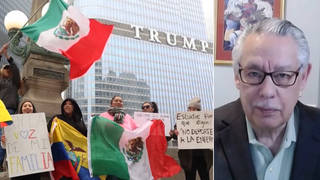

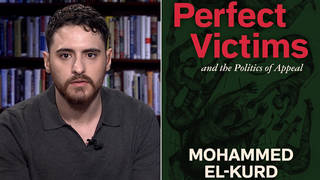


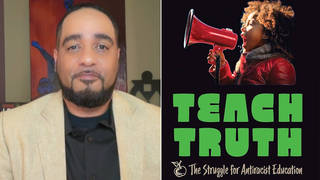


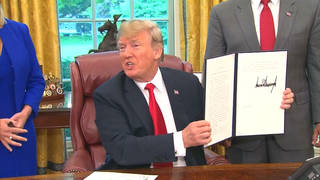
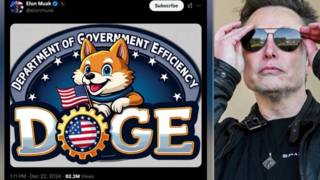
Media Options